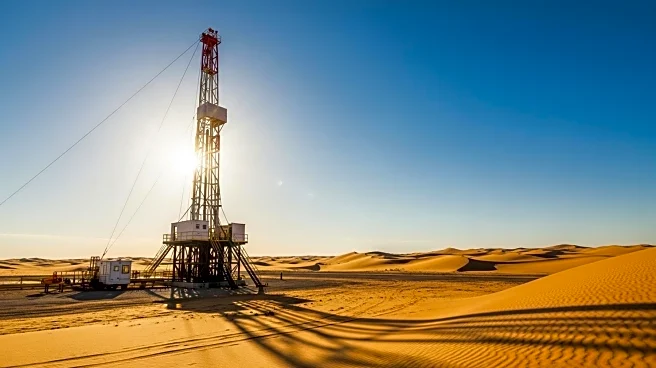What is the story about?
What's Happening?
BP has announced the approval of its $5 billion Tiber-Guadalupe project in the Gulf of America/Mexico, expected to begin production in 2030. The project will include a floating platform set to produce 80,000 barrels of oil a day, with an estimated 350 million barrels in recoverable resources. This move aligns with BP's strategic shift to increase its U.S. production to just over 1 million barrels a day by the end of the decade. French rival TotalEnergies has also announced plans to buy a 49% stake in Continental Resources' onshore gas fields in Oklahoma, further expanding its U.S. operations.
Why It's Important?
BP's investment in the Tiber-Guadalupe project is part of a broader strategic shift towards increasing oil and gas production in the U.S., which is seen as a vital component of the company's overall profits. The U.S. market is crucial for BP's plans to solidify its strategic revamp back towards oil and gas and away from renewable energy. President Trump has championed more investment in oil and gas since returning to office, aligning with BP's strategic goals. This development highlights the ongoing debate between fossil fuel investments and renewable energy initiatives.
What's Next?
BP plans to increase its U.S. production to just over 1 million barrels a day by the end of the decade, contributing to its global target of 2.3 million to 2.5 million barrels. The U.S. market is expected to play a significant role in BP's strategic revamp, with potential implications for the company's overall energy strategy. The approval of the Tiber-Guadalupe project may lead to further investments in U.S. oil and gas production, impacting the broader energy landscape.
Beyond the Headlines
BP's strategic shift towards increasing oil and gas production in the U.S. reflects broader industry trends and geopolitical dynamics. The company's move away from renewable energy initiatives highlights the ongoing debate between fossil fuel investments and sustainable energy solutions. The involvement of President Trump in championing more investment in oil and gas underscores the political dimensions of energy policy and its impact on global markets.















